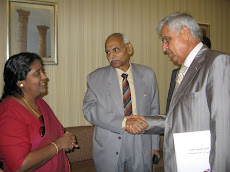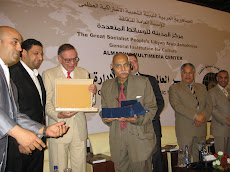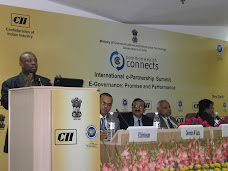This is an interesting article* on accountability of neo-governments, also called regulators, in India. The authors call them "governments within government" and allege that they are not subject to same level of accountability as the first three branches of government. Calling it a classic case of principal-agent, they describe the existing accountability mechanism for them and find that neo-governments have a more elaborate accountability mechanism in the U.S. They suggest creation of a Department of Neo-governments.
Dr D.C.Misra
October 5, 2007
-----------------------------------------------------------------------------------
*Accountability of neo-governments
With the growing reliance on neo-governments for governance, it is important that a holistic approach to building a uniform system of accountability is followed, say C K G Nair & M S Sahoo
NEO-GOVERNMENTS are governments within government and carry out governance on behalf of government in a pre-defined framework. They are epistemically called ‘regulators’ in India as their responsibilities include regulation. They also have other responsibilities, which are traditionally discharged by government. For example, Sebi has the responsibility of protecting investors in securities and developing the securities market, in addition to regulation.
Neo-governments are generally endowed with wider powers and sharper tools than the normal constitutional authorities. They blur the principle of separation of powers and are not subject to the same level of accountability, as the first three branches of government are. Governments continue to be accountable for governance, even if it is carried out through neo-governments — a classic case of the principal-agent problem. In case of exigencies, governments are called upon to explain and carry out rescue operations.
A well-crafted accountability mechanism reduces the ‘agency problem’, though the term ‘accountability’ is a misnomer. Many consider it synonymous with control and less of autonomy. In fact, accountability and autonomy go hand in hand. Higher the level of autonomy, greater the accountability and vice versa. The accountability arrangements for neo-governments, therefore, need to be clearly articulated so that the need for ex post changes in the conditions of the ex ante contracts are minimised for the sake of policy and operational stability. Otherwise, the government, accountable for the performance of neo-governments, may devise ad-hoc arrangements, leading at times to major disconnect with the ex ante contract, which may impinge on the autonomy of neo-governments and create avoidable tension between them.
Current accountability arrangements in India focus mainly on their role as regulators probably because they are so perceived. Through the administrative ministry the neo-governments lay on the table of Parliament subordinate legislation, annual report detailing their activities and performance, and statement of accounts audited by CAG. The departmental standing committees scrutinise their activities while approving their demand for grants or demand for grants of their administrative ministries, as the case may be. They are obliged to carry out the policy directions of government. In the face of substantial, apparent agency problem, the government may reconstitute the neo-governments by following a special procedure and under specified circumstances. Their orders are subject to appeal generally before a tribunal, with provision of judicial review up to the Supreme Court.
Neo-governments in the US are required to consult the stakeholders and public, and reveal the costs and benefits, while making subordinate legislation. The subordinate legislation with important bearings needs to be pre-approved by the Congress. The Government Accountability Office generally assesses the performance of neo-governments in terms of their objectives and efficiency and reports to the Congress. The neo-governments appear before the Congress twice a year and give testimony before the congressional oversight committees as often as required. Their budgets are approved by the Congress. One neo-government, namely, the Commodity Futures Trading Commission, has to even justify its continuation every five years before the Congress. The accountability arrangements are well laid out in the UK, where a ‘private limited company’ acts as the Financial Services Authority (FSA). The FSA reports to Parliament through the treasury and the Director General Fair Trading keeps a watch on the conformity of FSA regulatory actions from the sidelines.
THERE are certain standard arrangements for accountability. These include: ex ante accountability such as consultation with public and stakeholders before taking an action; ex post accountability such as reporting actions already taken; explanatory accountability such as disclosure of the rationale of the actions, procedural accountability such as adhering to standards of procedural fairness and transparency; and performance accountability.
The accountability arrangements rest on five main planks: articulation of the responsibilities, objectives and targets against which neo-governments may be held accountable; provision of powers, resources and capacity of neo-governments matching their assigned responsibilities; assignment of the affairs of the neo-governments to competent people who are comfortable with accountability arrangements; identification of stakeholders to whom neo-governments may be accountable; and education of stakeholders about the manner of ensuring accountability.
With the growing reliance on neo-governments for governance, it is important that a holistic approach to building a uniform system of accountability is followed. In order to achieve that, it may be worth creating a new department, say, department of neo-governments, with responsibilities similar to those of the DPEs in respect of PSUs. This department may monitor and review on an ongoing basis the performance of neo-governments vis-à-vis that of others in their peer group within the country and overseas and submit their reports for consideration by Parliament.
Since the administrative ministry is answerable to Parliament, the executive may get structured reports at regular intervals and specific reports as and when warranted. The neo-governments may have opportunity to explain their performance to Parliament and / or a committee of Parliament directly. They may disclose all relevant information to their stakeholders and take their inputs for making laws and their decision making process accessible to public and media. The crux of the issue is to spell out ex ante the mechanism of accountability to the legislature, the executive and to other stakeholders at large and to institutionalise the same so that it does not suffer from subjectivity.
Neo-governments as governance institutions need to follow a ‘benign’ approach of being accountable to the stakeholders in ‘disclosing’ that they are performing their tasks in tune with the objective of their creation. Such accountability arrangements, basically a contracting issue in reducing the agency problem, have to be pre-set to avoid institutional tensions, enhance autonomy and minimise the transaction costs in an increasingly information asymmetric world, the very raison d’etre of institutional innovations.
(The authors are civil servants. Views are personal.)
(Source: Nair, C K G and M S Sahoo (2007): Accountability of neo-governments, The Economic Times, New Delhi, October 5, Friday, p-16,
http://epaper.timesofindia.com/Daily/skins/ET/navigator.asp?Daily=ETD&login=default, accessed : October 5, 2007)
Friday, October 05, 2007
Thursday, October 04, 2007
Call for Papers-International Digital Government Research Conference (dg.o 2008)
According to information received by me,
The 9th International Digital Government Research Conference (dg.o 2008)
on "Partnerships for Public Innovation" will be held
at Hilton Bonaventure Hotel, Montreal, Canada
on May 18-21, 2008.
It has issued call for papers (CFPs).
Check for details the home page:
http://www.dgo2008.org
General inquiries may be addressed to:
dgo2008@easychair.org
Dr D.C.Misra
October 4, 2007
The 9th International Digital Government Research Conference (dg.o 2008)
on "Partnerships for Public Innovation" will be held
at Hilton Bonaventure Hotel, Montreal, Canada
on May 18-21, 2008.
It has issued call for papers (CFPs).
Check for details the home page:
http://www.dgo2008.org
General inquiries may be addressed to:
dgo2008@easychair.org
Dr D.C.Misra
October 4, 2007
Subscribe to:
Comments (Atom)





























